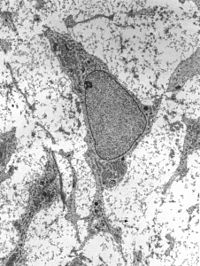
Photo from wikipedia
Wharton’s jelly-derived mesenchymal stromal cells (WJ-MSCs) have distinct immunomodulatory and protective effects against kidney, liver, or heart injury. Limited studies have shown that WJ-MSCs attenuates oxygen–glucose deprivation-mediated inflammation in hippocampal… Click to show full abstract
Wharton’s jelly-derived mesenchymal stromal cells (WJ-MSCs) have distinct immunomodulatory and protective effects against kidney, liver, or heart injury. Limited studies have shown that WJ-MSCs attenuates oxygen–glucose deprivation-mediated inflammation in hippocampal slices. The neuroprotective effect of intracerebral WJ-MSC transplantation against stroke has not been well characterized. The purpose of this study was to examine the neuroprotective effect of human WJ-MSC (hWJ-MSC) transplants in an animal model of stroke. Adult male Sprague–Dawley rats were anesthetized and placed in a stereotaxic frame. hWJ-MSCs, pre-labeled with chloromethyl benzamide 1,1’-dioctadecyl-3,3,3’3’- tetramethylindocarbocyanine perchlorate (CM-Dil), were transplanted to the right cerebral cortex at 10 min before a transient (60 min) right middle cerebral artery occlusion (MCAo). Transplantation of hWJ-MSCs significantly reduced neurological deficits at 3 and 5 days after MCAo. hWJ-MSC transplants also significantly reduced brain infarction and microglia activation in the penumbra. Grafted cells carrying CM-Dil fluorescence were identified at the grafted site in the ischemic core; these cells were mostly incorporated into ionized calcium-binding adaptor molecule (+) cells, suggesting these xenograft cells were immuno-rejected by the host. In another set of animals, hWJ-MSCs were transplanted in cyclosporine (CsA)-treated rats. hWJ-MSC transplants significantly reduced brain infarction, improved neurological function, and reduced neuroinflammation. Less phagocytosis of CM-dil-labeled grafted cells was found in the host brain after CsA treatment. Transplantation of hWJ-MSC significantly increased glia cell line-derived neurotrophic factor expression in the host brain. Taken together, our data support that intracerebral transplantation of hWJ-MSCs reduced neurodegeneration and inflammation in the stroke brain. The protective effect did not depend on the survival of grafted cells but may be indirectly mediated through the production of protective trophic factors from the transplants.
Journal Title: Cell Transplantation
Year Published: 2018
Link to full text (if available)
Share on Social Media: Sign Up to like & get
recommendations!